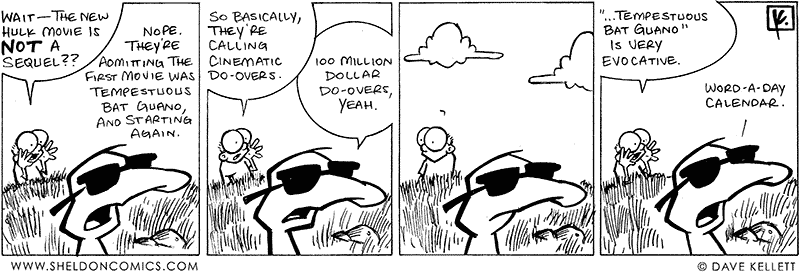Evocative-phrase-a-day calendars?
« previous post | next post »
Sheldon for 5/9/2008:
(Click on the image for a larger version, as usual.)
In my limited understanding of word-a-day products, they're not likely to give you multi-word noun phrases like "tempestuous bat guano", evocative or not. You might think that there's an unexploited market segment here, for evocative-noun-phrase-a-day calendars and other ENPAD properties. But on reflection, I think not — phrasal evocativeness is too individual.
For example, a reader wrote to me a few weeks ago that
I owe to Language Log my favourite phrase ever, by the way. 'Iterated polarization games' was quoted in a post sometime last year; I now wonder how I ever lived without it.
The phrase "iterated polarization games" came from "Gresham's Law meets the Law of Group Polarization", 5/7/2007, where it was quoted in turn from Cass Sunstein, "Deliberative trouble? Why groups go to extremes", The Yale Law Journal 110(1), 2000. I was pleased to have evoked enthusiasm for a well-wrought term of art. But to be receptive in this case, you'd need to understand some basic ideas of game theory, and be interested in the differentiation of culture, and so on. I doubt that market research would uncover a mass-market demand for a calendar featuring such phrases. (If you disagree, and happen to represent a major publishing conglomerate, feel free to contact Language Log Enterprises.)
Here's a similar example from my own intellectual history. Ralph Vanderslice and Peter Ladefoged ("Binary Suprasegmental Features and Transformational Word-Accentuation Rules", Language 48(4) 819-838) argued that "Empirical evidence for the distinctiveness of postnuclear secondary and tertiary (or quaternary) stresses is substantially non-existent", and in connection with one particularly obscure distinction, they commented in footnote 4 on p. 827 that
Obviously, we do not believe in the phonetic reality of these numerological anfractuosities.
"Numerological anfractuosities" was never my favorite phrase ever, but I liked it enough to recycle it in several talks and papers. And still, the only web hit for this once-evocative-to-me phrase remains the original Language article. It appears that to get the joke, as the saying goes, you had to "be there".
And in fact, I'm not "there" enough to be tempted to buy a calendar featuring "tempestuous bat guano". Chacun à son guano.

James said,
May 15, 2008 @ 9:20 am
You had an opportunity to submit your own Googlewhack (http://en.wikipedia.org/wiki/Google_wack) with "numerological anfractuosities". Unfortunately, by posting it here, its status as a googlewhack is now lost.
Pekka Karjalainen said,
May 15, 2008 @ 1:11 pm
When reading the comic, I first thought it implied that only one of the words was from a word-a-day calendar and the other two were supplied in this context by the character (Sheldon?). However, this somewhat trite interpretation would not have resulted in the idea of the Bat Guano series of evocative word-a-day calendars that I am now happily envisioning.
Bob Lieblich said,
May 15, 2008 @ 3:04 pm
At first I thought that the phrase you were setting us up for was "substantially non-existent." And while I have the floor, let's makes sure the kiddies are all aware of "terminological inexactitude."
John Laviolette said,
May 15, 2008 @ 4:31 pm
I don't know. Sometimes, words or phrases that require a specific, highly-technical background become evocative to a group outside that background, for reasons that have to do more with sound or appearance than meaning.
For example, the group that hangs out in alt.religion.kibology (mentioned a few weeks back in a Language Log post about the fractal theory of Canada) latched onto the phrase "nudibranch branes", even though most kibologists aren't biologists. As a result, "brane" has been re-interpreted as a canonical misspelling of "brain".
Sili said,
May 15, 2008 @ 7:54 pm
I too thought that the words had come from different days; "tempestuous" one day, "guano" another – prolly with the explanation that it can can from bats and birds alike.
The odd thing, though, is that Arthur (the duck) talks because Sheldon (the boy) uploaded speach synth software and an encyclopedia to his brain. He shouldn't need word of the day calendar in the first place …